Carrots or sticks to take on North Korea?
- Published
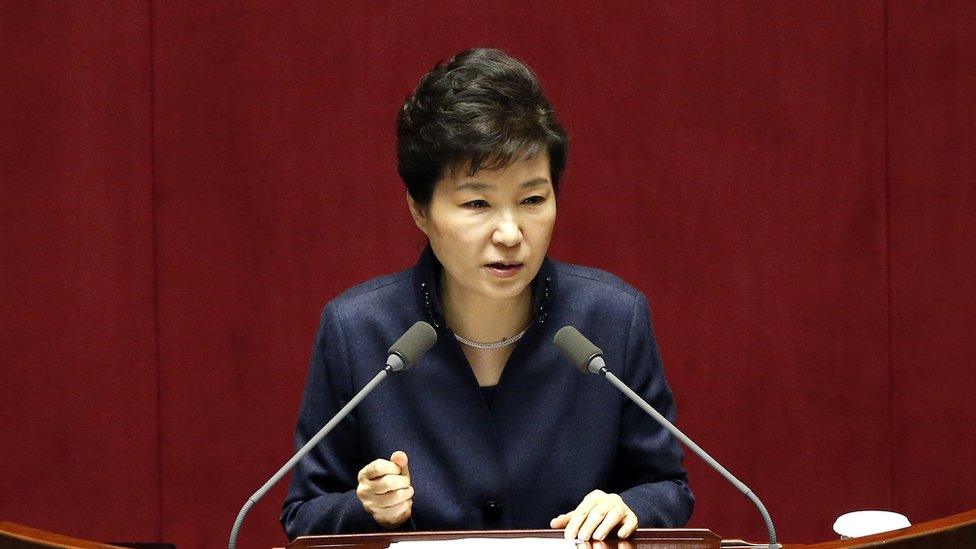
President Park said South Korea would take harsh steps to deal with North Korea's nuclear ambitions
The edition of The Korea Times of 17 February was not a triumph of the headline writer's art. "Park vows to change N. Korea with sticks", external, it shouted in big, bold letters.
President Park of South Korea would use sticks to beat North Korea into submission, a reader unused to metaphor might have inferred.
What was actually being alluded to, of course, was that the day of the carrot was over. Carrots were limp as promoters of change.
From now on, for South Korea, the big stick would be brandished to force North Korea to renounce its nuclear ambitions.
The implication is that what little engagement there has been has failed to soft-soap Kim Jong-un into change. It's brought nothing but a fourth nuclear test and the launch of a rocket which much of the outside world perceives as the test to develop a missile capable one day of hitting the west coast of the United States with a nuclear bomb.

On top of the tests, the sudden removal of very senior military officers cranked up the fear that the regime was not completely secure.
But there is outside North Korea a divided view about whether sanctions - the stick approach - will work. President Park of South Korea and President Obama of the United States clearly think it might - both countries have tightened sanctions.
'Punishing a masochist'
But there is scepticism among some independent and authoritative observers of North Korea.
"It's like punishing a masochist," Prof John Delury of Yonsei University in Seoul told the BBC. The logic of sanctions is "bleed them 'til they cry for mercy - but their system thrives in isolation".
On this reading, President Park's decision to close the Kaesong industrial zone was a mistake. Kaesong was one of the few areas of co-operation between north and south. It's a town just inside North Korea in which 54,000 North Korean workers were employed by South Korean companies.
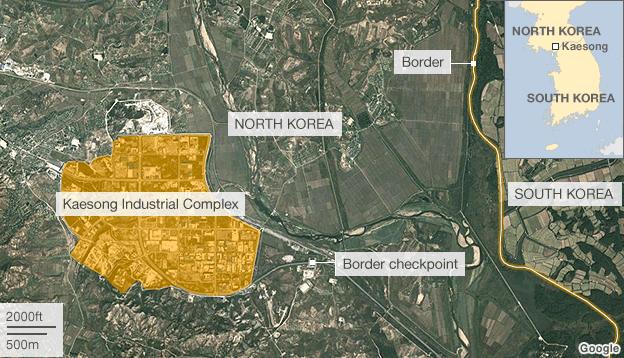
It would have been better, Prof Delury feels, to expand Kaesong so more and more North Korean workers would have experienced outside ways.
Including simple things like just having a shower. Song Gin Seok, the chief executive of a company making paragliders in Kaesong until it was shut abruptly, told the BBC that when he moved production there 10 years ago, he was struck by the smell of the workers. They had insufficient access to hot water and bath facilities so at his factory he insisted on showers and a laundry.
The result was that their appearance - and smell - improved. The quality of their skin and nails improved as they ate soups provided each day. He said they were curious about the ways of the south.
Whatever the improvements in personal hygiene and nutrition, the stick has now taken over. Carrots are for yesterday.
Whether either will work depends on what you think is really going on in Pyongyang and, in particular, in the mind of Kim Jong-un.
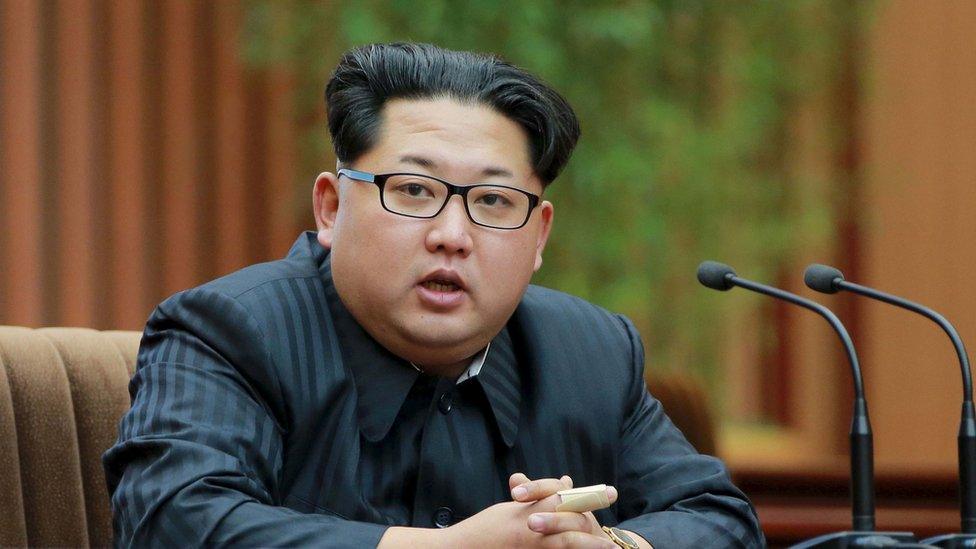
Kim Jong-un is portrayed very differently inside and outside North Korea
Loyalty 'not enough'
He is often portrayed outside North Korea as a buffoon (inside, he is portrayed as anything but - as virtually a god, in fact).
And not just as a fool, but as an erratic fool with a gun. In recent months, two top military leaders have been purged, both with unverified reports of executions.
General Ri Yong-gil vanished from public view as the chief of the general staff and seems to have been replaced. And last year, South Korean intelligence said it had learnt that the country's defence minister, Hyon Yong-chol was dismissed. Reports that he had been executed by anti-aircraft gun were later backtracked on.
Either way, North Korea's military leaders cannot bank on quiet retirement. They must fear for their jobs, if not their lives.
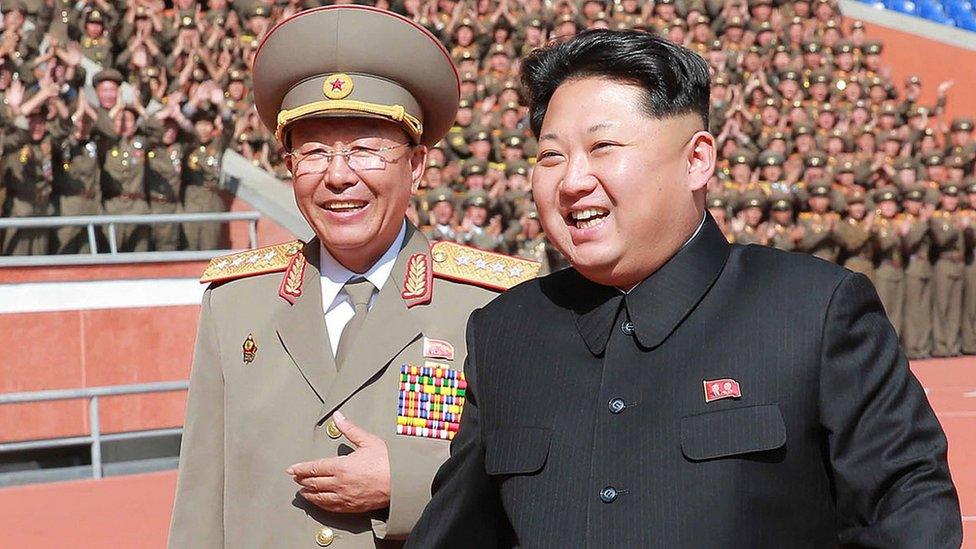
Ri Yong-gil (L) had been pictured laughing with Kim Jong-un at a military parade in October
The latest purge, that of Ri Yong-gil, came out of the blue. As Adam Cathcart of Leeds University put it: "It is obviously difficult to say if he's dead or alive, but his ouster indicates again that acts of mass sycophancy or loyalty are not enough.
"A few months ago in Pyongyang, Ri had arranged a stadium full of Korean People's Army simply for the purpose of cheering wildly for Kim Jong-un who glided by in his limousine.
"But that was obviously not enough to retain the young leader's trust or affection."
His father's son
Is Kim Jong-un, then, a departure from his father and grandfather? Is he more vicious and unpredictable?
According to Michael Madden of North Korea Leadership Watch, it does seem as though the son is removing top military people around him faster than his father did.
All the same, Kim Jong-il removed people, too. He was not some sort of benevolent dictator compared with the vicious renegade son.
Both followed the same game plan - to get nuclear weapons and so to have independence not only from Washington but also Beijing and Moscow.
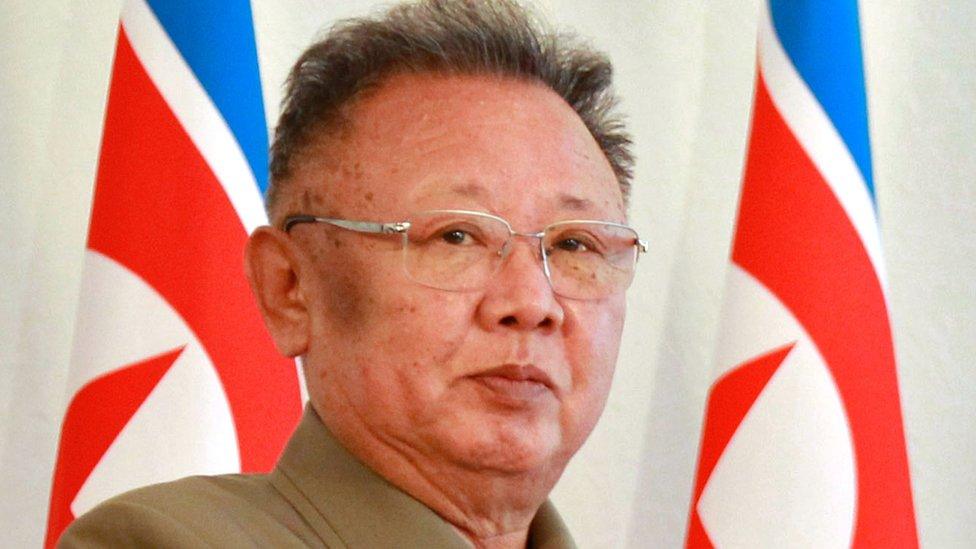
Kim Jong-un is seen at home as continuing his father's legacy
As Dr Cathcart put it: "In terms of nuclear and missile tests, Kim Jong-un is not only using the standard family playbook, but these acts are also interpreted within North Korean state media very much as acts of loyalty to Kim Jong-il and the capstone of that dead leader's legacy.
"In other words, Kim Jong-un is the executor of the legacy."
There used to be a view that the regime in Pyongyang was on its last legs. Collapse was imminent. It hasn't happened and the "collapsist" view is not so strongly held these days.
"There's nothing erratic about Kim Jong-un," says Prof John Delury. "I don't share the view that he's about to collapse. There's less doubt than there used to be about whether he's in control. There used to be a lot of sceptics but now those sceptics are falling by the wayside."
Fifth test?
And the North Korean leader still has cards to play. South Korean intelligence reckons a fifth nuclear test may be on the way. As North Korea gets more expert in its technology, it is becoming harder to see what it's up to.
The fourth test came virtually out of the blue because so much of the research and preparation is carried underground, with the tunnels and entrances already built.

North Korea's latest nuclear testing
Moment North Korean TV announces hydrogen bomb test
On 6 January North Korea said it had successfully carried out its first underground test of a hydrogen bomb - a more powerful weapon than an atomic bomb
A 5.1 magnitude tremor was detected about 50km (30 miles) from Kilju city, near the Punggye-ri nuclear site, which monitors said was likely not natural
Observers agree a nuclear explosion of some kind took place and it seems to have been a bit bigger than the last test in 2013, but not nearly big enough to be a full thermonuclear explosion - an "H-bomb" - as Pyongyang claims
Previous tests were carried out in October 2006, May 2009 and February 2013
Despite North Korea's claims, experts are sceptical that North Korea can make a nuclear weapon small enough to fit on a missile

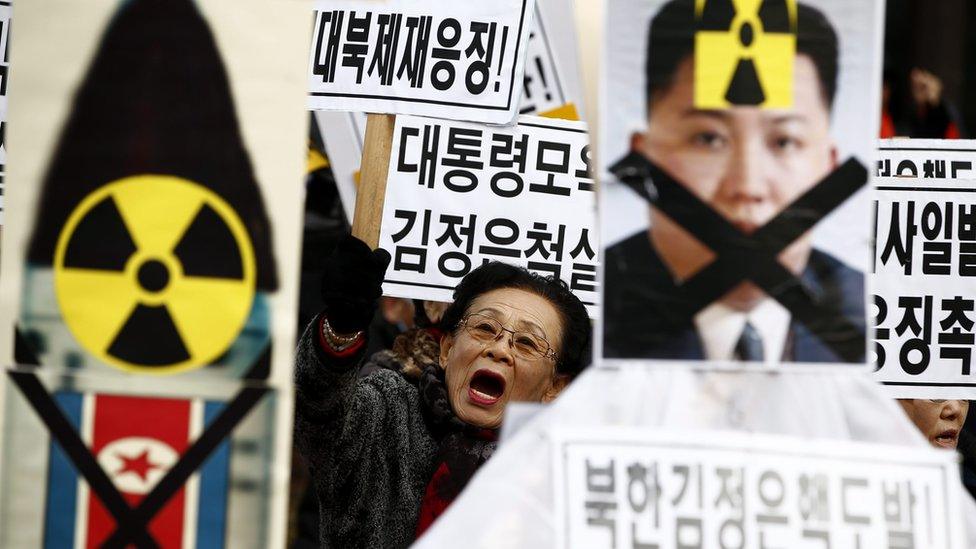
Pyongyang's nuclear testing has led to protests in South Korea
"The January 6 test indicates that the North Koreans can now conduct a nuclear test with little or no advance notice based on imagery observations alone," according to 38 North, external, the group of academics associated with Johns Hopkins University in Baltimore who analyse satellite pictures of the test site at Punggye-ri.
"It may be the result of careful planning to avoid detection by commercial satellites as they pass overhead or by instituting a practice of gradual, low-key preparations that take place over months - activity almost indistinguishable from construction, tunnel excavation and maintenance."
The upshot is that there are no signs that North Korea is thinking about giving up its pursuit of nuclear weapons. Full-steam ahead is the order from Pyongyang. There are no signs, either, that the regime is tottering.
Neither sticks nor carrots have worked.